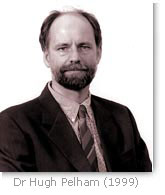 |
 |
The Croonian Lecture
 The Croonian Lecture is the Society’s premier lecture in the biological sciences. Dr Croone, one of the original members of the Society, left on his death in 1684 a scheme for two lectureships, one at the Royal Society and the other at the Royal College of Physicians. His widow, in 1701, provided the means for carrying out this scheme and indicated that the bequest was ‘for the support of a lecture and illustrative experiment for the advancement of natural knowledge on local motion, or (conditionally) of such other subjects as, in the opinion of the President for the time being, should be most useful in promoting the objects for which the Royal Society was instituted’. A gift of £1000 is also associated with the lecture. The Croonian Lecture is the Society’s premier lecture in the biological sciences. Dr Croone, one of the original members of the Society, left on his death in 1684 a scheme for two lectureships, one at the Royal Society and the other at the Royal College of Physicians. His widow, in 1701, provided the means for carrying out this scheme and indicated that the bequest was ‘for the support of a lecture and illustrative experiment for the advancement of natural knowledge on local motion, or (conditionally) of such other subjects as, in the opinion of the President for the time being, should be most useful in promoting the objects for which the Royal Society was instituted’. A gift of £1000 is also associated with the lecture.
|
 |
Previous winners include: |
 |
  |
2000 Nigel Unwin – the nicotinic acetylcholine receptor and the structural basis of synaptic transmission
1999 Hugh Pelham – Intracellular membrane traffic: getting proteins sorted.
1998 Philip Cohen – Discovery of a protein kinase cascade of major importance in insulin signal transduction.
1997 Anthony Hunter – The phosphorylation of proteins on tyrosine: its role in cell growth and disease.
1996 Thomas Lindahl – Endogenous damage to DNA.
1995 Thomas Southwood – Natural communities: structure and dynamics.
1994 Roy Anderson – Populations, infectious disease and immunity: a very nonlinear world.
1993 John Vane – The endothelium: maestro of the blood circulation
1992 Jacques Miller – The key role of the thymus in the body’s defence strategies.
1991 Anthony Bradshaw – Genostasis and the limits to evolution?
1990 Robert Hinde – The interdependence of the behavioural sciences.
|
|
Royal Society I News & Media I Events Diary I Grants & Funding I Science for all I Science Policy I Library I Publications I Facilities I Fellows Room I Search I Home |
 |
|